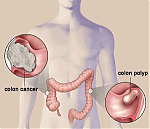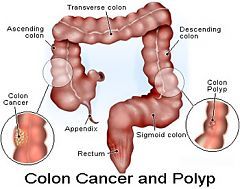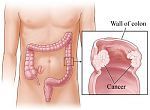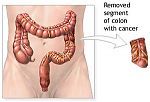Colon Cancer: An Introduction
 Colon cancer is a disease that affects the large intestine. It is also known by the term of colorectal cancer. A cancer of the colon occurs when cells of the colon, are able to transform into cells that do not look or function normally. Usually a cancer will develop from a mutation in genes of the DNA of the cell. A cancer can also result from an infection or from certain chemicals.
Colon cancer is a disease that affects the large intestine. It is also known by the term of colorectal cancer. A cancer of the colon occurs when cells of the colon, are able to transform into cells that do not look or function normally. Usually a cancer will develop from a mutation in genes of the DNA of the cell. A cancer can also result from an infection or from certain chemicals.
Since cancers are result of normal cells having their genes mutated, it is possible to inherit this mutation between parents and children, and siblings. Colon cancer is one type of cancer in which people with a parent or sibling with this disease should be tested more regularly than those without.
Once the cancer cell DNA has become mutated, the cells will not resemble or function like regular cells. Another problem with cancer cells is their tendency to leave the organ they were originally “born” in and migrate to spread cancer to other organs. In this way, it is possible to develop cancer in other organs.
Examples of organs that colon cancer cells might spread to include the brain, liver, or lungs. These organs are all vital to the survival of the human being, and this is why colon cancer can become fatal in some people.
The problem with colon cancer is that the number of people being diagnosed with this disease is increased. It is considered the second most common cancer in women, whereas in men it is the third most common cancer. During this year, there has been an estimated 50,000 deaths in the United States due to colon cancer.
Colon cancer is classified as an adenocarcinoma. All this means is that a cancer occurring in the large inestine will start in an organ where there are glands present. The glands of the colon will secrete mainly secrete mucus to soften the waste as it moves through.
Even though colon cancer can be fatal it is possible through early detection, proper diet and exercise, and colon cleaning to prolong or prevent this disease from occurring.
Colon Cancer Prevention Through Colon Cleansing

A typical American diet tends to be low in fiber and digestive enzymes. Hence your body produces more digestive enzymes at the expense of immune system enzymes. The low level of fiber prevents your large intestine from cleaning itself. This leads to a buildup of toxins and waste. The accumulation of toxic matter in the digestive system can give rise to colon cancer. It is possible that your weakened immune system will not be able to fight the disease.
Colon Polyps

A polyp is an abnormal growth of tissue protruding from the mucous membrane of some internal organs – the mucous membrane is the protective lining on the inner walls of these organs. When such an unwanted growth occurs inside the large intestine, it is called a colon polyp. All polyps result from abnormal cell division and growth. Colon polyps are somewhat like tumors, but quite harmless if small in size. But polyps larger than a pea can prove dangerous because they can gradually turn into cancer.
Colon Rectal Cancer

Colon Rectal Cancer, or colorectal cancer, is having disastrous effects worldwide. It is the third most common cancer in the Western world, 4th in the United States. It is also the second leading cause of cancer related deaths in the United States and the rest of the Western world. Colon Rectal Cancer attacks the large intestine and/or the rectum, two integral parts in the maintenance of normal bodily functions. This is due to the colon being storage for waste material of the digestive system with the rectum located at its end.
Colon Cancer Treatment

The treatment of colon cancer depends on the state in which the disease has advanced. If it is in an early stage it can be cured but once it reaches an advanced state it is less likely that it will be cured.
There are three types of treatment available for people who are suffering from colon cancer. These include chemotherapy, radiation therapy and surgery. Surgery is usually the first treatment that is prescribed, because the tumor needs to be removed.








